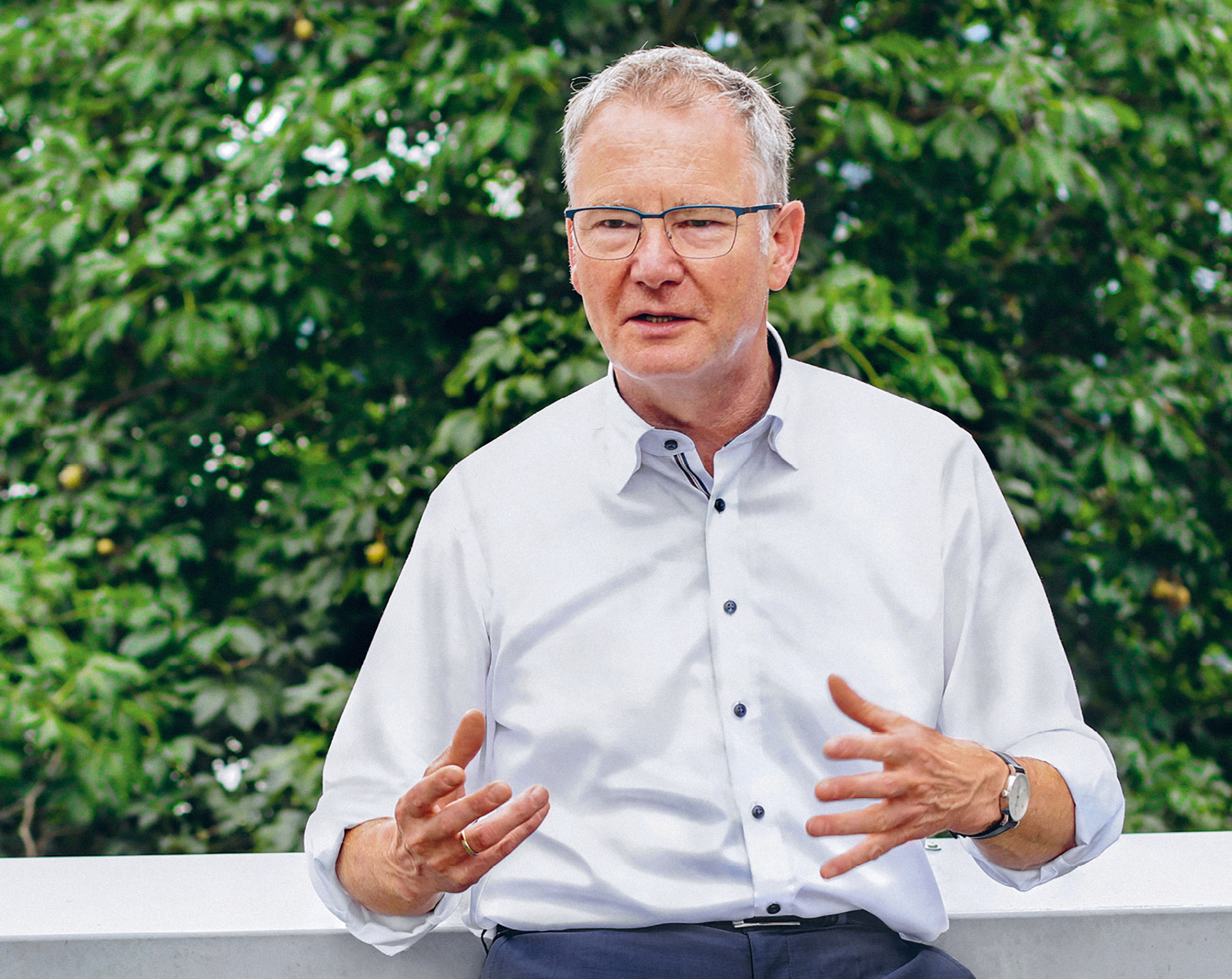Experience from past economic slumps shows that companies that remain innovative even in times of crisis are significantly more resilient than others. Roland Bent, CTO of Phoenix Contact, and Eckart Uhlmann, Director of Fraunhofer IPK, discuss in the context of the current pandemic how companies can not only master difficult phases, but also grow from them.
futur: Mr. Bent, according to Clarivate, Phoenix Contact is the only German company to be one of 24 »innovators to watch« worldwide for the »Top 100 Global Innovators« ranking. What is the secret of your success?
Bent:
I believe it is our will to always make things a little bit better. We are determined to be at the top of our game, technologically speaking. This idea is in Phoenix Contact’s DNA and is exemplified by the owner’s family and passed on to our employees as a defining corporate philosophy. What’s more, we have an exceptionally broad product portfolio for a company of our size. We cover the entire range of industrial automation and connection technology with a high degree of vertical integration and with the ambition of mastering the technologies we need to do so ourselves. This ranges from a surge protection plug, a basic technical connection element, to cybersecurity, software, and cloud connectivity. We not only want to follow trends, we want to set them. And we want to be on the podium when market shares are distributed.
futur: Mr. Uhlmann, how has Fraunhofer managed to hold its own in the rankings for seven years in a row?
Uhlmann:
We were born into this, so to speak. Fraunhofer was founded in 1949 to help the economy get back on its feet after World War II. It aimed to do so with application-oriented research and development and strove to transform new ideas and technologies into products that could assert themselves on the market. This commitment to innovation is what drives us even today. Therefore, exploiting solutions that we develop from prototypes into mature applications plays a central role in our innovation process. That is why Fraunhofer is one of the most active patent applicants worldwide.
futur: What general conditions are necessary for a successful innovation strategy?
Bent:
First of all, it must mesh with the corporate strategy. That sounds trivial, but is not always the case. And, above all, you need an innovation culture. We need employees who feel like entrepreneurs and take responsibility for the company’s success. We need to be willing to take risks: Mistakes are part of any success. Market proximity: A developer who never sees the application of their products will not realize their full potential. Trust: If someone constantly fears for their job, they will not be creative. And transparency: To really talk to one another instead of talking about each other. If you take this to heart, you will generate enthusiasm among your employees – for your company and for its innovations.
Uhlmann:
For us at IPK, there is an additional factor: We require a broad spectrum of fundamental knowledge as the basis for our application-oriented research. That is why our innovation strategy is called alliance. We work very closely with our partner institute at TU Berlin and the Bundesanstalt für Materialforschung und -prüfung (BAM) and transform the results of their basic research projects into application-ready solutions. And we do this starting from a batch size of 1: We do not sell millions of units of a particular clamp. Rather, we sell a single technology just once. Therefore, we have a wide variety of expertise and methods as well as a high level of interdisciplinarity, so we can not only offer individual components but complete systems.
futur: A McKinsey survey among medium-sized companies published in May revealed that the more companies invest in digitalization, the better they expect their own sales prognosis to be. In which area do you currently see the greatest potential or need for digitalization solutions?
Bent:
In addition to value creation processes, it is primarily the administrative processes. We have more or less well integrated ERP systems in almost all companies today, but otherwise a low level of automation in administration. The same applies to product development as well as marketing and sales departments. At the moment, we are also very much driven by major social problems. Take the UN Sustainable Development Goals, for example. An energy or mobility transition will not succeed without digitalization. During the corona crisis, we are currently learning how digitalization can also help make our companies and our value chains more resilient. Starting with working from home and extending to the possibility of bringing production back to high-wage countries by means of intelligent automation, thereby relativizing the fragility of global value chains.
Uhlmann:
Above all, I think we need digitally integrated value creation networks. This is where we can gain momentum, also in the integration of SMEs as system suppliers. The concept of crowd production has potential for the digital networking of individual specialized companies, which then act as one face to the customer. Digitalization can also provide even more support with developing new business models – away from selling a product to selling an availability, a benefit. I also see great potential in transitioning from digitally networked forms of production to sustainable, fully integrated production system environments. This is a huge challenge that can only be met with modular digitalization.
futur: Current economic figures indicate that the industries particularly hard hit by the current crisis are those whose international supply chains have collapsed due to the pandemic. In your opinion, what impact will this have on the future organization of production? Will entire value chains move closer to the sales markets?
Bent:
I believe so, yes. Such effects will occur as a result of people learning from the crisis. This is not an argument against globalization but a meaningful reaction to what we are currently experiencing. We ourselves are pursuing a local-for-local concept. That means we are consolidating the value chains at the sites where we produce. This does not always work, nor does it always make sense, but if it does, it leads to much more robust systems. In this case, digitalization gives us new opportunities to increase the efficiency of our production sites and value chains so that greater local autonomy can also be implemented economically.
Uhlmann:
Local networks are also being strongly promoted in our region. After all, it is no longer just a question of quality, time, and costs when it comes to evaluating supply chains, but a matter of dynamics and flexibility in cooperation. Nevertheless, international networks will continue to exist. This is precisely why the aspect of production resilience is as topical as it is. How can we react quickly to unexpected changes in order to keep our production systems stable? We need solutions for this. That is why Fraunhofer has established its own resilience research. Adaptability and speed of change, robustness, reliability, and predictability are the aspects we are investigating here.
futur: How important is it to be internationally positioned, not only in production but also in research and development?
Bent:
It is extremely important, even for small and medium-sized companies like we were when we set up the first local innovation teams in the USA and China. Today, teams of more than 100 development experts are active at each location. Being on site is simply part of a globalization strategy. We have an extremely high level of convergence of technology and knowledge, and yet the demands on technology vary from region to region on the world market. The reasons may be economic in nature or due to different norms and standards, but they are, above all, related to cultural aspects. Recognizing a customer’s needs and understanding the relevance of their problem does not work over a distance of 10,000 kilometers. Nor does it work with a German understanding of engineering when it comes to issues in India, China, or the USA. That’s why we are internationally involved, not only in production, but also in research.
Uhlmann:
The German economy is very export-oriented and as an R&D service provider, we must also be where our customers are. There are clear prerequisites for our international commitment: Scientific value creation for our institute on the one hand and positive effects for both Germany and the respective partner country on the other. In São José dos Campos, for example, we work together with one of Brazil’s top engineering universities as well as German and Brazilian companies from various sectors and support SENAI, the Brazilian National Service for Industrial Training, with the strategic planning and nationwide implementation of research institutes.
futur: What advice do you have for other companies like yourself, but also for small and medium-sized enterprises with whom you work, as well as for start-ups, to help them stay ahead of the international competition in the future?
Bent:
Think visionary. Think about future possibilities and consider what is necessary to achieve these goals. That will enable you to overcome even apparent limitations. Let me give you an example: Today, we are one of the leading suppliers of charging connector systems for electric mobility. Ten years ago, e-mobility was almost exclusively a topic for geeks. At the time, we decided to back this horse because we had certain assumptions and technological insights, but also because we thought we could do it. Today, this is a very successful business unit for us, with more than 300 employees and sales in the upper seven figures. It could certainly have been a huge flop. But if you are not prepared to take such risks, you will not be able to go beyond the normal incremental development of a company. I believe that right now is the time to have the courage to push companies to take the next big leap.
Uhlmann:
We need to rethink our business models. Medium-sized companies in particular will not survive, if they continue to sell individual components in as large quantities as possible. In many cases, we are already experiencing today that it is no longer a product that is sold, but a function. Companies must open up and develop a capacity for cooperation in order to develop systems solutions together with others. My recommendation for SMEs as well as for start-ups: Join strategic alliances in order to stay competitive in the long term.
 Fraunhofer Institute for Production Systems and Design Technology
Fraunhofer Institute for Production Systems and Design Technology



